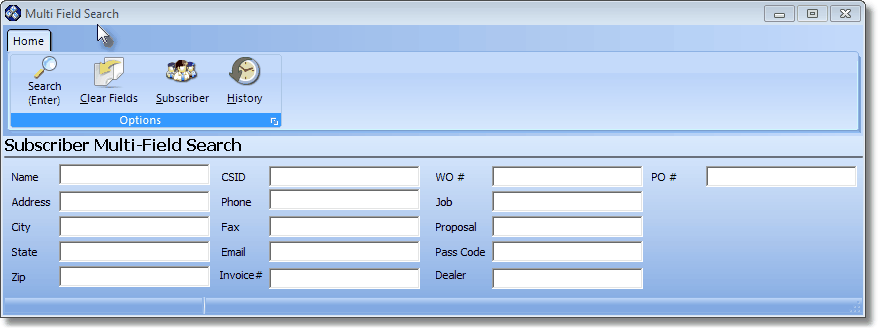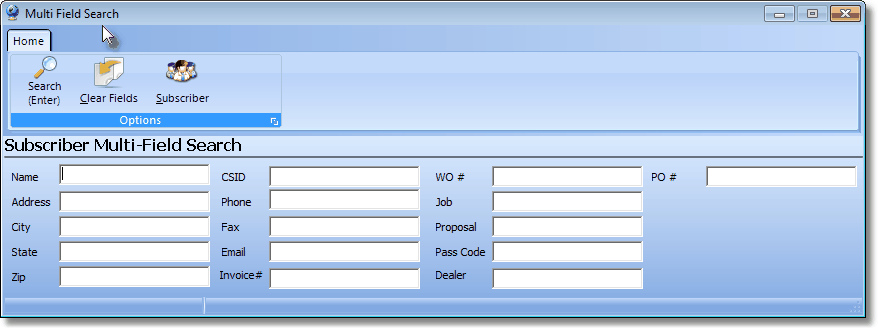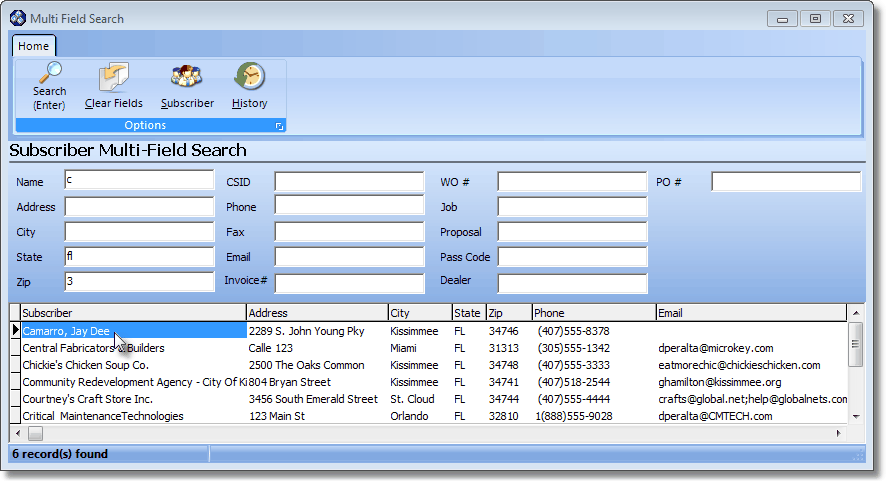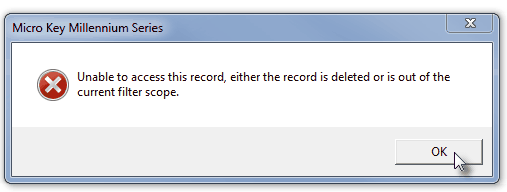| □ | The special Subscriber Multi-Field Search, which is accessible from anywhere within both MKMS and MKMSCS by Pressing Ctrl+Alt+F, provides a powerful and amazingly fast Subscriber record locator, coupled with the ability to open the associated Subscriber Form (and/or the related Universal Account History Form (if accessing this Form from within MKMS). |
| • | To open the Subscriber Multi-Field Search dialog, from anywhere within MKMS and MKMSCS Press Ctrl+Alt+F together, at the same time. |

Multi-Field Search Form default view
| • | The Subscriber Multi-Field Search Form will be displayed (as shown above). |
| □ | Understanding the Icons on the Subscriber Multi-Field Search Form: |

Multi-Field Search - Options
| • | Home - The Home tab on the Subscriber Multi-Field Search Form provides four (4) Option Icons: |
| 1. | Search (Enter) - Once the Search Information has been entered, Click the Search Icon (or Press8 Enter) to execute that Search. |
| 2. | Clear Fields - To remove any existing Search Information and start another Search, Click the Clear Fields Icon. |
| 3. | Subscriber - After the Search Results List is displayed, Select the desired Subscriber line item, then Click the Subscriber Icon (or Double-Click the Subscriber line item) to open the Subscribers Form to display that selected Subscriber information. |
| 4. | History - If using the Multi-Field Search function within MKMS, after the Search Results List is displayed, Select the desired Subscriber line item, then Click the History Icon to open the Universal Account History Form with All History displayed for the last Month for that selected Subscriber. |
| ► | Note: As illustrated below, the Multi-Field Search function within MKMSCS does not include the History button. |

Multi-Field Search Form has no History option if accessed in MKMSCS
| □ | Using the Subscriber Multi-Field Search Form: |
| • | Name - The Name (which may be either a Person or a Business) is compared with the Name field in the Subscribers Form |
| ▪ | Upper and Lower Case letters are treated the same (the Search Information is not case sensitive). |
| ▪ | The search is performed assuming the Search Information represents the beginning of the data in the Name field. |
| ▪ | If any are included as a result of a Multi-Field Search, Deleted Subscribers will be listed in Red |
| • | Address - The Address is compared with the Street field in the Subscribers Form |
| ▪ | Upper and Lower Case letters are treated the same (the Search Information is not case sensitive). |
| ▪ | The search is performed assuming the Search Information represents any part of the data in the Address field. |
| • | City - The City is compared with the City field in the Subscribers Form |
| ▪ | Upper and Lower Case letters are treated the same (the Search Information is not case sensitive). |
| ▪ | The search is performed assuming the Search Information represents the beginning of the data in the City field. |
| • | State - The State is compared with the State field in the Subscribers Form |
| ▪ | Upper and Lower Case letters are treated the same (the Search Information is not case sensitive). |
| ▪ | The search is performed assuming the Search Information represents the beginning of the data in the State field. |
| • | Zip - The Zip is compared with the Zip field in the Subscribers Form |
| ▪ | Numbers are expected unless this is an International Account. |
| ▪ | Upper and Lower Case letters are treated the same (the Search Information is not case sensitive). |
| ▪ | The search is performed assuming the Search Information represents the beginning of the data in the Zip field. |
| ▪ | Upper and Lower Case letters are treated the same (the Search Information is not case sensitive). |
| ▪ | The search is performed assuming the Search Information represents the beginning of the data in the CSID field of any Subscriber Panel record. |
| • | Phone - The Phone is compared with the Primary Tel field in the Subscribers Form |
| ▪ | The Search Information entered must be formatted properly to be "understood" as a Search. |
| ▪ | The search is performed assuming the Search Information represents the beginning of the data in thein the Fax field. |
| o | Primary Tel = " (407)870-0040" Search Information = " (407)87" (each begins with a <space>.) |
| o | The Search Information would be valid because the " (407)87" matches the beginning of the telephone number in the Primary Tel field. |
| • | Fax - The Fax is compared with the Fax field in the Subscribers Form |
| ▪ | The Search Information entered must be formatted properly to be "understood" as a Search. |
| ▪ | The search is performed assuming the Search Information represents the beginning of the data in the Fax field. |
| o | Fax = " (407)870-9271" Search Information = " (407)87" (each begins with a <space>.) |
| o | The Search Information would be valid because the " (407)87" matches the beginning of the telephone number in the Fax field. |
| • | Email - The Email is compared with the EMail field in the Subscribers Form |
| ▪ | Upper and Lower Case letters are treated the same (the Search Information is not case sensitive). |
| ▪ | The search is performed assuming the Search Information represents the beginning of the data in the Email field. |
| • | Invoice # - The Invoice # is compared with the Invoice Number field on the Sales Form. |
| ▪ | Numbers are expected but any characters may be (but shouldn't) entered. |
| ▪ | The search is performed assuming the Search Information represents the beginning of the data in the Invoice Number field. |
| ▪ | Therefore a partial (beginning part of an) Invoice Number may be entered. |
| • | WO # - The WO # is compared with the Work Order Number field on the Service Request Form. |
| ▪ | Numbers are expected but any characters may be (but shouldn't) entered. |
| ▪ | The search is performed assuming the Search Information represents the beginning of the data in the WO # field. |
| ▪ | Therefore a partial (beginning part of a) Work Order Number may be entered. |
| • | Job - The Job # is compared with the Job # Number field on the Job Costing Form. |
| ▪ | Numbers are expected but any characters may be (but shouldn't) entered. |
| ▪ | The search is performed assuming the Search Information represents the beginning of the data in the Job # field. |
| ▪ | Therefore a partial (beginning part of a) Job Number may be entered. |
| • | Proposal - The Proposal number is compared with the Proposal Number field on the Proposal Form. |
| ▪ | Numbers are expected but any characters may be (but shouldn't) entered. |
| ▪ | The search is performed assuming the Search Information represents the beginning of the data in Proposal Number field. |
| ▪ | Therefore a partial (beginning part of an) Proposal Number may be entered. |
| • | Pass Code - The Pass Code is compared with the Pass Code field within the Central Station tab of the People To Call Form |
| ▪ | Upper and Lower Case letters are treated the same (the Search Information is not case sensitive). |
| ▪ | The search is performed assuming the Search Information represents the beginning of the data in the Pass Code field for any People To Call record related to the desired Subscriber. |
| • | Dealer - The Dealer is compared with the Name field in the Dealers Form |
| ▪ | Upper and Lower Case letters are treated the same (the Search Information is not case sensitive). |
| ▪ | The search is performed assuming the Search Information represents the beginning of the data in the Dealers Name field. |
| • | PO # - The PO # is compared with the Purchase Order assigned to a Sales Invoice |
| ▪ | Numbers are expected but any characters may be entered. |
| ▪ | Upper and Lower Case letters are treated the same (the Search Information is not case sensitive). |
| ▪ | The search is performed assuming the Search Information represents the beginning of the data in the Purchase Order field on the Sales Form. |
| • | Search Information - Enter Search Information into any combination of these predefined Search Fields. |
| • | Upper and Lower Case letters are treated the same (the Search Information is not case sensitive). |
| • | Numbers are always allowed, but no special field Formatting is provided (so entries for Telephone Numbers, Zip Codes, etc. are not pre-formatted). |
| • | Multiple Search Fields may be filled in to refine the best Search Information (e.g., the Subscriber's Name begins with a "Co", they are located in "Kissimmee" and their Zip Code is "34757"). |
| ▪ | As long as that Search Information does not exclude everyone, one or more records will be displayed. |
| ▪ | If there are conflicting Search Field entries, no record will be listed (e.g., a partial Name and City are entered, but the Zip Code entered does not match any Subscriber with that partially entered Name and City combination). |
| ▪ | Therefore, as Search Information is entered, think about the old adage "Less is More" and enter as little information as possible to find the desired Subscriber record. |
| ▪ | The Search Information can always be enhanced later to reduce the number of records displayed in the Search Results List. |
| • | Pressing 8 Enter, or Clicking the Search Icon at the top of the Subscriber Multi-Field Search Form will instantly execute the Search. |
| ▪ | A list of the Subscriber record(s) that match the Search Information entered, will be displayed immediately. |
| ▪ | In the example below, very littleSearch Information produced a Search Results List with many Subscriber records from which the User may choose the appropriate one. |

Subscriber Multi-Field Search - Search Results List
| ▪ | Double-Click on the Subscriber line item and the Subscribers Form will open with the selected Subscriber record displayed. |
| o | If the selected record represents a Deleted Subscriber and the User has not Checked the See Old Subscribers/Vendors? box within the Personal Options tab on the User Options Form, an error message will be displayed as follows: |

| o | Click OK to clear this message box. |
| o | The Subscribers Form will be displayed with the first record (alphabetically) shown. |
| o | Close the Subscribers Form to return to the Multi Field Search dialog. |








